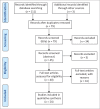Cochleovestibular findings linked to COVID-19: A scoping review for clinical care planning in South Africa
- PMID: 36073075
- PMCID: PMC9452924
- DOI: 10.4102/sajcd.v69i2.899
Cochleovestibular findings linked to COVID-19: A scoping review for clinical care planning in South Africa
Abstract
Background: On 30 January 2020, the World Health Organization (WHO) officially declared an outbreak of the coronavirus disease 2019 (COVID-19) to be a global health emergency. Research has focused on the impact and response to life-threatening symptoms of COVID-19 across the lifespan; however, there is a need to investigate the effects of COVID-19 on the cochleovestibular system, as viral infections are known to impact this system. This is particularly important for contexts where resources are limited and prioritisation of resources requires strong risk versus benefit evaluations.
Objective: Therefore, the purpose of this scoping review was to investigate published evidence on the impact of COVID-19 on the cochleovestibular system across the lifespan in order to allow for strategic clinical care planning in South Africa, where capacity versus demand challenges exist.
Methods: Electronic bibliographic databases such as CINAHL, EBSCOHost, MEDLINE, ProQuest, PubMed, Scopus and ScienceDirect were searched for peer-reviewed publications between January 2020 and January 2022. These had to be published in English and related to the impact of COVID-19 on the cochleovestibular system, where the question was: 'what evidence has been published on the impact of COVID-19 on the cochleovestibular system?' Review selection and characterisation was performed by the researcher with an independent review by a colleague using pretested forms.
Results: Of a total of 24 studies that met the inclusion criteria, the current scoping review revealed limited conclusive published evidence linking COVID-19 to permanent hearing function symptoms. Current evidence supports the possibility of COVID-19, similar to other viral infections in adults, impacting the cochleovestibular system and causing tinnitus, vertigo and sudden sensorineural hearing loss (SSNHL), with the symptoms being generally temporary and resolving either partially or completely following therapy with steroids, with very inconclusive findings in the paediatric population.
Conclusion: These findings raise global implications for properly designed studies, which include longitudinal follow-up of cases across the lifespan, examining this link with some focus on establishing the pathophysiologic mechanisms at play as well. In the meanwhile, current findings raise the value of polymerase chain reaction (PCR) testing for all patients presenting with unexplained cochleovestibular symptoms during the pandemic, as these may be the only presenting symptoms indicating COVID-19, thus requiring careful treatment and management.
Keywords: COVID-19; South Africa; audiology; clinical; cochleovestibular; hearing loss; planning; steroids; tinnitus; vertigo.
Conflict of interest statement
The author declares that she has no financial or personal relationships that may have inappropriately influenced her in writing this article.
Figures
Similar articles
-
Middle ear status - structure, function and pathology: A scoping review on middle ear status of COVID-19 positive patients.S Afr J Commun Disord. 2022 Jul 25;69(2):e1-e7. doi: 10.4102/sajcd.v69i2.910. S Afr J Commun Disord. 2022. PMID: 35924607 Free PMC article.
-
Beyond the black stump: rapid reviews of health research issues affecting regional, rural and remote Australia.Med J Aust. 2020 Dec;213 Suppl 11:S3-S32.e1. doi: 10.5694/mja2.50881. Med J Aust. 2020. PMID: 33314144
-
South African hearing conservation programmes in the context of tele-audiology: A scoping review.S Afr J Commun Disord. 2020 Mar 3;67(2):e1-e10. doi: 10.4102/sajcd.v67i2.670. S Afr J Commun Disord. 2020. PMID: 32129657 Free PMC article.
-
Simulations as a mode of clinical training in healthcare professions: A scoping review to guide planning in speech-language pathology and audiology during the COVID-19 pandemic and beyond.S Afr J Commun Disord. 2022 Aug 2;69(2):e1-e13. doi: 10.4102/sajcd.v69i2.905. S Afr J Commun Disord. 2022. PMID: 36073069 Free PMC article.
-
Clinical Practice Guideline: Sudden Hearing Loss (Update) Executive Summary.Otolaryngol Head Neck Surg. 2019 Aug;161(2):195-210. doi: 10.1177/0194599819859883. Otolaryngol Head Neck Surg. 2019. PMID: 31369349
Cited by
-
An online survey on clinical characteristics of otologic symptoms linked to COVID-19 infection.Front Public Health. 2023 May 26;11:1184262. doi: 10.3389/fpubh.2023.1184262. eCollection 2023. Front Public Health. 2023. PMID: 37304124 Free PMC article.
-
In pursuit of increasing the application of tele-audiology in South Africa: COVID-19 puts on the alert for patient site facilitator training.S Afr J Commun Disord. 2022 Jul 20;69(2):e1-e10. doi: 10.4102/sajcd.v69i2.900. S Afr J Commun Disord. 2022. PMID: 35924605 Free PMC article.
-
The impact of COVID-19 on speech-language and hearing professions in low- and middle-income countries: Challenges and opportunities explored.S Afr J Commun Disord. 2022 Sep 9;69(2):e1-e15. doi: 10.4102/sajcd.v69i2.937. S Afr J Commun Disord. 2022. PMID: 36226974 Free PMC article.
References
-
- Aleem, A., Ab, A.S., & Slenker, A.K. (2021). Emerging variants of SARS-CoV-2 and novel therapeutics against coronavirus (COVID-19). Treasure Island, FL: StatPearls. - PubMed
Publication types
MeSH terms
LinkOut - more resources
Full Text Sources
Medical
Miscellaneous

